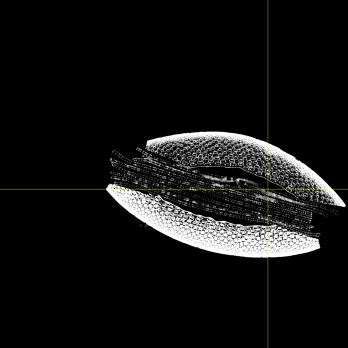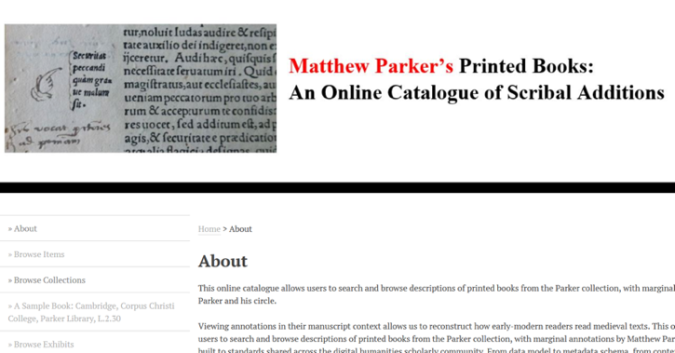With support from the Mellon Foundation, SSHRC, and at the University of Toronto, the Centre for Medieval Studies, the Office of the Vice President, Research, UTM, and the Jackman Humanities Institute, we are involved in several digital humanities initiatives including:
The Early Illustrated Apollonius of Tyre: Perspectives on the Palimpsest Fragment in Sinai Arabic NF 8
A Workshop of the Andrew W. Mellon-funded “The Book and the Silk Roads” and the SSHRC-funded “Apollonius of Tyre in Italy”
19-20 April 2021
A research event of The Book and the Silk Roads project (2019–2021) funded by the Andrew W. Mellon foundation, this virtual workshop explores the significance of a recent discovery: an early fragment of a popular Latin romance, the Historia Apollonii Regis Tyri (The History of Apollonius King of Tyre), found in a palimpsest forming part of the manuscript MS Arabic NF 8, in the library of St. Catherine’s Monastery, Sinai, Egypt.
The recent discovery of the Sinai fragment has excited early manuscript scholars and Apollonius experts alike due to its apparent early date: prior to 650CE, and thus several hundred years earlier than the next surviving witness. The fragment is of further interest because it is from a deluxe copy complete with an illustration, confirming long-held suspicions that the early text circulated in an illustrated form.
Our workshop contributors will speak on the discovery of the fragment as well as its scientific imaging, codicological and paleographical features, illustration, and significance for understanding the early history of the codex, as well as what can be gleaned from the fragment about the original manuscript’s production and use. The workshop will also contextualize the fragment’s long life and reuse within the multi-cultural, early monastic setting of St. Catherine’s Monastery — a site that has gained increasing attention in recent years due to the discovery of new texts in palimpsest through the scientific imaging of the Sinai Palimpsests Project.
The workshop is also generously supported by the SSHRC-funded “Apollonius of Tyre in Italy” project, directed by Will Robins, President of Victoria University at the University of Toronto.
For more information, contact the organizers at jessica.lockhart [at] utoronto.ca.
Textiles in Manuscripts Workshop
PLEASE NOTE: The Textiles in Manuscripts Workshop has been postponed, and rescheduled from its original dates of May 4-5 to new dates of JUNE 2-3, 2021.
New session times will be posted on the Program page of the workshop website in early May: https://booksilkroadstextiles.artsci.utoronto.ca/
*All current registrants have been sent an email, moving their registration to June 2-3. If you need to cancel your registration, please see the link to cancel within that email.
From the Book and the Silk Roads team:
Canada’s Association for University Teachers (CAUT) recently voted unanimously to censure the University of Toronto (UofT) over a matter of academic freedom. The censure asks that Canadian university faculty boycott the UofT until the censure is lifted. Some faculty outside of Canada have elected to join the boycott. More may do so. The Book and the Silk Roads (BSR) project is based at the UofT, which is one of the two main sponsors of this workshop, along with The Institute for Advanced Study in Princeton. In light of the fact that no resolution has been reached between CAUT and UofT over CAUT’s recent censure of the University, we regret that we are postponing the Textiles in Manuscripts Workshop to 2-3 June, 2021. We apologize for the great inconvenience. We are optimistic that in a month’s time a solution may be closer at hand.
The aim of this virtual workshop is to examine the vast use of textiles in manuscripts, both practical and ornamental: their uses within bindings, as wrappers, enclosures, and covering, as cloth used to protect images, and as symbolic or talismanic artefacts. Workshop sessions focus on the use of textiles in Armenian, Chinese, Ethiopian, Islamic, Kashmiri, and Syriac manuscripts from the middle ages through the early modern period. The workshop is not meant to be exhaustive, but to take a unique approach in beginning an interdisciplinary conversation about the production and use of manuscripts across the Silk Roads.
Each session explores content presented in pre-recorded videos that participants watch in advance of the workshop. The pre-recorded videos will be made live on the workshop website by April 20, and will be available to the public both before and after the workshop itself.
Sessions and co-discussants include: Ethiopian (Eyob Derillo, Michael Gervers), Armenian (Bryan Keene, Sylvie Merian, Hrair Hawk Khatcherian), Syriac (Thelma Thomas, Georgios Boudalis, Aaron Butts), Chinese (Michael C. Wang, Martin Heijdra), Islamic (Karin Scheper, Sabine Schmidtke), and Kashmiri (Marika Sardar, Jasdip Singh Dillon, Luther Obrock). Moderators will guide a generous Q&A discussion between co-discussants and workshop participants.
The workshop is filling up! Sessions will not be recorded, so register only if you are able to attend.
For more program information, and to access the pre-recorded videos, visit the Textiles in Manuscripts Workshop website: http://booksilkroadstextiles.artsci.utoronto.ca/
The Book and the Silk Roads. University of Toronto Libraries, 2019–2021.
The Book and the Silk Roads is a joint project between the Centre for Medieval Studies––PIs Alex Gillespie and Suzanne Akbari––and Information Technology Services in University of Toronto Libraries––PI Sian Meikle. Our project aims to address two interrelated questions:
How can comparative codicology—the examination of the materials and structures of manuscripts—challenge the Eurocentrism of so many efforts to write the history of the book?

Can book history—the study of knowledge transmission in media that change over time—serve as the underpinning for a more ambitious project that describes connections between parts of the premodern world by describing the technology of the codex?
With new physical evidence, the CMS-ITS project team proposes to challenge a too-familiar history of the book in which Gutenberg’s moveable type and our own era’s digital communication technologies are the natural outcomes of a triumphant tradition of Western ingenuity that begins with the antique Greek and Roman adoption of the phonetic alphabet and Christian Rome’s invention of the codex. The story we will tell is both richer and more complex. Using non-destructive scientific methods to mine details from surviving books—especially the binding structures used to turn books from parts into wholes—and combining these discoveries with historical research, we can trace the book’s development through a mix of local experiment and innovation and the transnational exchange of ideas, material, and craft practices. A global approach to premodern book history can transform the story of human communication technology by revealing the networks of relationships—as well as the more complex technological and material entanglements—that knit together our premodern world.
Digital Tools for Manuscript Study. University of Toronto Libraries, 2015–2018.
An increasing number of scholars and students use digitized medieval manuscripts to carry out their work. Their needs are the same as those working with physical manuscripts: they want to compare pages, take notes, describe quires, leaves and booklets using collation diagrams, and discuss their findings with other scholars. To that end, University of Toronto Libraries and the Centre for Medieval Studies’ Old Books New Science Lab have partnered to undertake a project––“Digital Tools for Manuscript Study” ––funded by the Andrew W. Mellon Foundation. Our project, which is grounded in the research practices of manuscript scholars, seeks to simplify digital manuscript research by making manuscript images themselves much easier to use. We aim to create useful and long-lasting tools that improve researchers’ experience working with digitized books.

Book of Fame. University of Toronto, 2015–2018.
Conducted under the supervision of Professor Alexandra Gillespie, a group of undergraduate and graduate students engaged in the development of an edutainment video game built around the issues and questions raised by the transition of archival research into the digital environment.

From the website: “Margaret Atwood has written and donated a new Canterbury Tale to the Thomas Fisher Rare Book Library, which is in the process of digitizing its major collections for online libraries. During an experimental test-run of the digitization algorithm on Atwood’s archives, a hacker group––working with the digitized consciousness of Geoffrey Chaucer’s close friend and retroactive nemesis John Gower––injects a virus into the program that deletes all records of the Atwood Tale from the Fisher while copying and scattering fragments into other major digital libraries around the world. Gower, enemy of literary transmission and all things authorial, further disrupts the Fisher’s preservation efforts by inserting his own variants of the Atwood Tale into these digital archives to thwart any researcher’s attempt to reconstruct the original text.
Responding to the public’s cry for help, the player is tasked with investigating the crime scene and tracing the digital fingerprints in the Fisher’s archives to discover where Gower has hidden the fragments of the Atwood Tale. Atwood and LeVostreGC appear in the digital archives and function as NPC companions to the player, offering hints and helping to stabilize corrupted text. The player uses a computer terminal inside the Fisher’s reading room to “jack in” to digital libraries around the world and remedy corruptions in their manuscript data. Upon debugging corrupted manuscripts by solving puzzles and completing mini-games, the player acquires fragments of the Atwood Tale that can then be restored to the Fisher’s digital archives and used to reconstruct Atwood’s lost Canterbury Tale.”
Matthew Parker’s Printed Books. University of Toronto Libraries, 2015.
This online catalogue allows users to search and browse descriptions of printed books from the Parker collection, with marginal annotations by Matthew Parker and his circle.
For access to this project, email alexandra.gillespie “at” utoronto.ca to arrange a login.

John Stow’s Books. University of Toronto Libraries, 2015.
Much like the Parker’s Scribes project, John Stow’s Books allows users to search and browse descriptions of the manuscripts and early printed books the Elizabethan antiquary owned and annotated. We argue Stow’s books are worthy of concentrated study, for what they can tell us about his fascinating career and as a basis for some new ways of thinking about early modern England.
For access to this project, email alexandra.gillespie “at” utoronto.ca to arrange a login.


